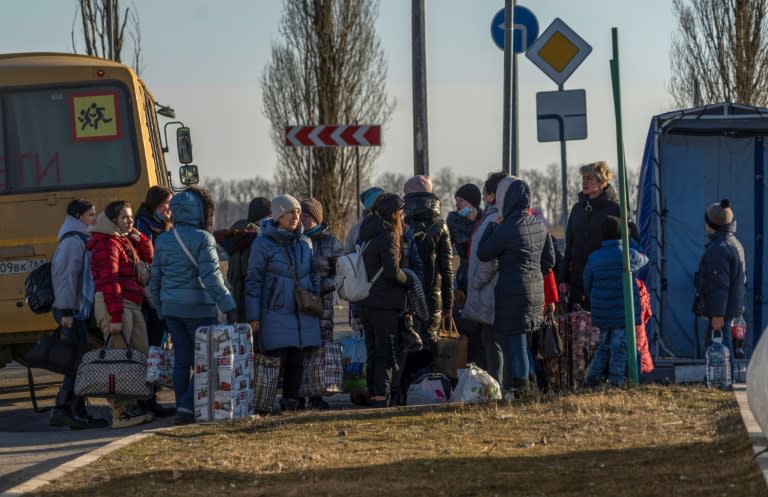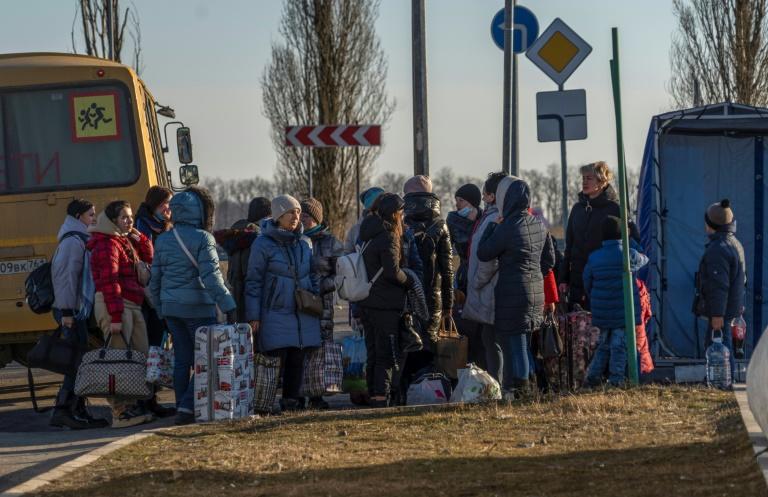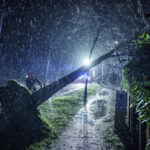
French President Emmanuel Macron will call Russia’s Vladimir Putin on Sunday to try to avert what Western powers predict will be an imminent invasion of Ukraine.
Over the weekend, civilians were evacuated from increasingly barraged front line regions where Kyiv said Saturday two of its soldiers had died in an attack — the first fatalities in the conflict in more than a month.
The Kremlin insists it has no incursion plans, but its test-firing of nuclear-capable missiles Saturday did little to alleviate tensions.
“Every indication indicates that Russia is planning a full-fledged attack against Ukraine,” NATO chief Jens Stoltenberg said.
US President Joe Biden, who earlier said he was “convinced” Russia would invade in the coming days, is convening a rare Sunday National Security Council meeting over the crisis.
US and EU officials have said they believe Moscow is attempting to fabricate a pretext for its offensive by having proxy outlets put out false information about violence in rebel-held enclaves in eastern Ukraine.
“Locals in Donetsk reported calm despite Russian claims of a car bomb,” said US State Department spokesman Ned Price.
Speaking to Macron on Saturday, Ukrainian President Volodymyr Zelensky said he would not respond to Russia’s provocations, according to the Elysee.
But in his speech to the Munich Security Conference, he also condemned “a policy of appeasement” towards Moscow.
“For eight years, Ukraine has been holding back one of the greatest armies in the world,” he said.
He called for “clear, feasible timeframes” for Ukraine to join the US-led NATO military alliance — something Moscow has said is a red line for its security.
– Strategic missile tests –
Western officials in Munich warned of enormous sanctions if Russia attacks, with US Vice President Kamala Harris saying this would only see NATO reinforce its “eastern flank”.
The United States insists that, with around 150,000 Russian troops on Ukraine’s borders — as many as 190,000, when including the Russian-backed separatist forces in the east — Moscow has already made up its mind to invade.
Russia has in recent days announced a series of withdrawals of its forces from near Ukraine, saying they were taking part in regular military exercises.
Around 30,000 Russian troops are in Belarus for an exercise due to end on Sunday.
Afterwards, Moscow says these forces will return to barracks, but US intelligence is concerned they could take part in an invasion of Ukraine.
From the Kremlin situation room, Putin and visiting Belarus President Alexander Lukashenko watched the launch of Russia’s latest hypersonic, cruise and nuclear-capable ballistic missiles on Saturday.
Putin has also stepped up his rhetoric, reiterating demands for written guarantees that Ukraine will never be allowed to join NATO and for the alliance to roll back deployments in eastern Europe to positions from decades ago.
– ‘Dramatic increase’ in clashes –
The volatile front line between Ukraine’s army and Russian-backed separatists has seen a “dramatic increase” in ceasefire violations, international monitors from the OSCE European security body have said.
Hundreds of artillery and mortar attacks were reported in recent days, in a conflict that has rumbled on for eight years and claimed more than 14,000 lives.
The OSCE said Saturday there had been 1,500 ceasefire violations in Donetsk and Lugansk in just one day.
A dozen mortar shells fell within a few hundred metres (yards) of Ukraine’s Interior Minister Denys Monastyrskiy Saturday as he met journalists.
The pro-Russian rebels declared general mobilisations in the two regions, calling up men to fight even as they announced the mass evacuations of women and children.
Moscow and the rebels have accused Kyiv of planning an assault to retake the regions, claims fiercely denied by Ukraine and dismissed by the West.
Ukrainian Foreign Minister Dmytro Kuleba denounced reports of Ukrainian shells falling on Russian territory as “fake”.
Germany and France on Saturday urged their citizens to leave Ukraine. NATO said it was relocating staff from Kyiv to Lviv in the west of the country and Brussels.
German airlines Lufthansa and Austrian Airlines said they would stop flights to Kyiv and Odessa from Monday until the end of February, but would maintain flights to western Ukraine.
bur-mm/har/lb/mtp




